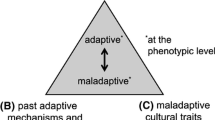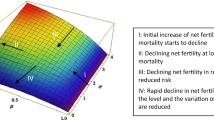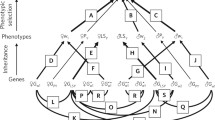Abstract
It is sometimes suggested that modern life, with its planned fertility and medically assisted compensation for genetic disadvantage, has greatly reduced the power of natural selection to produce significant further human evolution. However, this overlooks the very recent and dramatic changes that have occurred in the patterns of human mortality, driven by the development of increasingly benign living conditions. Where the genetics of survival are significantly influenced by life history trade-offs, as is now thought to be the case for ageing and longevity, a change in the environment can shift the optimal balance that was established through natural selection under previous conditions. We examine this possibility in the context of the dramatic recent change in the mortality pressure exerted by infectious disease using a model of a hypothetical immunogenetic trade-off that weighs survival against fecundity. Our results predict that such a change might have a significant effect on population genetics over relatively short-timescales, and they may also resolve the paradox of genes that impair fertility in present-day populations by showing how such genes might be a legacy from a powerful trade-off that has acted until very recently.
Similar content being viewed by others
References
Charlesworth B (2000) Fisher, Medawar, Hamilton and the evolution of aging. Genetics 156(3):927–931
Doblhammer G (2000) Reproductive history and mortality later in life: a comparative study of England and Wales and Austria. Popul Stud 54(2):169–176
Doblhammer G, Oeppen J (2003) Reproduction and longevity among the British peerage: the effect of frailty and health selection. Proc R Soc Lond Ser B-Biol Sci 270(1524):1541–1547
Drenos F, Kirkwood TBL (2005) Modelling the disposable soma theory of ageing. Mech Ageing Dev 126(1): 99–103
Finch CE, Crimmins EM (2004) Inflammatory exposure and historical changes in human life-spans. Science 305(5691):1736–1739
Jones S (2000) The language of the genes. Flamingo Press, London
Kirkwood TBL (1997) The origins of human ageing. Philos␣Transact R Soc Lond Ser B-Biol Sci 352(1363): 1765–1772
Kirkwood TBL (2005) Understanding the odd science of aging. Cell 120(4):437–447
Kirkwood TBL, Austad SN (2000) Why do we age?. Nature 408(6809):233–238
Kirkwood TBL, Rose MR (1991) Evolution of senescence—late survival sacrificed for reproduction. Philos Transact R Soc Lond Ser B-Biol Sci 332(1262):15–24
Korpelainen H (2000) Fitness, reproduction and longevity among European aristocratic and rural Finnish families in the 1700s and 1800s. Proc R Soc Lond Ser B-Biol Sci 267(1454):1765–1770
Lee RD (2003) Rethinking the evolutionary theory of aging: transfers, not births, shape social species. Proc Natl Acad Sci USA 100(16):9637–9642
Lopez AD, Ahmad OB, Guillot M, Inoue M, Ferguson BD, Salomon JA (2001) Life tables for 191 countries for 2000: data, methods, results (GPE discussion paper no. 40). World Health Organization, Geneva
Luckinbill LS, Arking R etal (1984) Selection for delayed senescence in Drosophila melanogaster. Evolution 38(5):996–1003
Lycett JE, Dunbar RIM etal (2000) Longevity and the costs of reproduction in a historical human population. Proc R Soc Lond Ser B-Biol Sci 267(1438):31–35
Partridge L, Gems D (2002) Mechanisms of ageing: public or private?. Nat Rev Genet 3(3):165–175
Rose MR (1984) Laboratory evolution of postponed senescence in Drosophila melanogaster. Evolution 38(5):1004–1010
Stearns SC (1992) The evolution of life histories. Oxford University Press, Oxford
Thomas F, Teriokhin AT etal (2000) Human longevity at the cost of reproductive success: evidence from global data. J Evol Biol 13(3):409–414
Westendorp RGJ (2004) Are we becoming less disposable? Embo Rep 5(1):2–6
Westendorp RGJ, Kirkwood TBL (1998) Human longevity at the cost of reproductive success. Nature 396(6713):743–746
Westendorp RGJ, Kirkwood TBL (1999) Longevity— does family size matter? Reply. Nature 399(6736): 522
Westendorp RGJ, van Dunne GM etal (2001) Optimizing human fertility and survival. Nat Med 7(8): 873–873
Williams GC (1957) Pleiotropy, natural selection, and the evolution of senescence. Evolution 11:398–411
Zwaan B, Bijlsma R etal (1995) Direct selection on life-span in Drosophila melanogaster. Evolution 49(4): 649–659
Acknowledgement
We thank the Dr Hadwen Trust for financial support and two referees for helpful comments.
Author information
Authors and Affiliations
Corresponding author
Rights and permissions
About this article
Cite this article
Drenos, F., Westendorp, R.G.J. & Kirkwood, T.B.L. Trade-off Mediated Effects on the Genetics of Human Survival Caused by Increasingly Benign Living Conditions. Biogerontology 7, 287–295 (2006). https://doi.org/10.1007/s10522-006-9027-9
Received:
Accepted:
Published:
Issue Date:
DOI: https://doi.org/10.1007/s10522-006-9027-9




